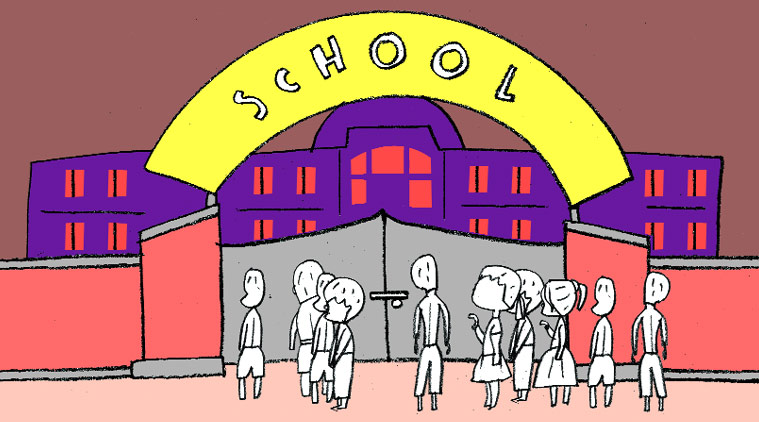A Lesson To Learn
Government has forgotten that children have a first right to nation’s resources

The Economic Survey of the year 2017-18 released this week shows states and the Union government together have been investing less than 3 per cent of the country’s GDP in education.
The hubris is now turning leaders of the central government delusional about their power. What else could have emboldened Human Resource Development Minister Prakash Javdekar to utter the following words. “Some schools come to the government with a begging bowl asking for funds. They can easily ask their alumni for help. It is the duty of the alumni to contribute to their school, their college and this attitude of ‘give it back’ should be cultivated by schools,” he said, while speaking at a function in Jnana Prabodhini, a school in Pune, some days ago. He lauded the school for not seeking alms from the state but motivating its alumni to donate funds.
The mainstream media was quiet about the minister’s statement. But he was challenged on the social media and forced to regret his “begging bowl” remark. He said it was an inadvertent error and that there was no scope for a controversy since he has withdrawn the controversial portion of his statement. It is important to note that he has only withdrawn a part of the statement. That he stands by the rest of it is sufficient reason to question the minister.
First, the statement says a lot about the self-image of the government. It thinks it is the lord of the land and the people are its subjects. What people think as their due is, in fact, a largesse offered by it. The government seems to have forgotten that it is the people’s money which runs it and its task is only to administer the resources that people generate. The government, surely, is not the master. To compare people demanding their due with beggars betrays the government’s arrogance. The government, of course, decides everything for schools, including how many teachers each school needs, the infrastructure they must have and so on.
The present government’s approach to school education is revealing. A report in this newspaper said: “The Economic Survey of the year 2017-18 released this week shows that the states and the Union government together have been investing less than 3 per cent of the country’s GDP in education or, in the survey’s definition, in education, sports, arts and culture. Six years ago, that is in 2012-13, education expenditure was 3.1 per cent of the GDP. It fell in 2014-15 to 2.8 per cent and registered a further drop to 2.4 per cent in 2015-16. Although, there have been some signs of recovery since 2016-17 (2.6 per cent), expenditure on education hasn’t been restored to the 2012-13 level, let alone be anywhere close to the government aim of touching 6 per cent of GDP.”
The Right To Education Act was adopted after a long struggle in 2011 by a reluctant political class. Its effectiveness depended on the proper allocation of resources towards infrastructure, midday meal, teacher education at different levels, text book preparation and other related areas. However, the government has been downsizing its education budget. In 2013-14, allocation for education was 4.77 per cent of the Union Budget. It fell to 4.61 per cent in 2014-15, 3.89 per cent in 2015-16, 3.66 per cent in 2016-17, 3.17 per cent in 2017-18 and then rose slightly to 3.48 per cent. The Economic Survey was frank in admitting that “being a developing economy, there is not enough fiscal space to increase the expenditure on critical social infrastructure like education and health in India.”
At the Pune function, the minister also spoke about his resolve to curtail the school curriculum by 50 per cent to make room for extra-curricular activities. How did he decide that 50 per cent of the curriculum could go? According to the National Curriculum Framework, 2005, “a curriculum is neither a document nor a sequence of experiences. It is a plan of facilitating learning for the child. This plan starts from where the child is, enumerates all the aspects and dimensions of learning that are considered necessary, gives reasons why such and such learning is considered necessary, and what educational aims it would serve. The plan also defines stage-specific objectives, what content to teach, and how to organise it. It also recommends general principles of teaching methods and evaluation and criteria for good teaching-learning material.”
Curriculum is, therefore, about (i) the general objectives of education at a particular stage or class; (ii) subject-wise instructional objectives and content; (iii) courses of studies and time allocation; (iv) teaching/learning experiences; (v) instructional aids and materials; (vi) evaluation of learning outcomes and feedback to pupils, teachers and parents. Clearly, the minister seems to confuse curriculum for syllabus. The notion of “extra curricular” has largely been abandoned to make schooling a wholesome learning experience. This is why governments are being asked to spend on sports and other activities which are not extra curricular activities, but the right of every child.
When we speak of schools, images of children flash before our eyes. They have the first right on the resources of the nation. To see them as beggars is unpardonable.
The writer teaches at Delhi University
For all the latest Opinion News, download Indian Express App
More From Apoorvanand
- Kandhamal without closureA decade after anti-Christian violence took a toll, there are no signs of remorse ..
- Gandhi’s talisman for RahulCongress must remember: When in doubt, stand with the persecuted. ..
- For Whom The Bells TrollThe trolls that target Sushma Swaraj are a byproduct of her and her party’s politics..












.png)



























No hay comentarios:
Publicar un comentario